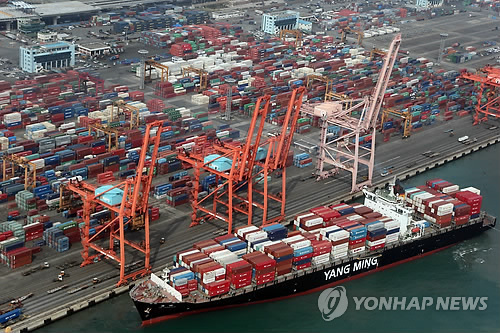Increased imports help narrow current account surplus in August
By Korea HeraldPublished : Oct. 4, 2016 - 17:09
South Korea recorded its lowest current account surplus in four months in August due to a slight increase in imports, the central bank said on Tuesday.
The Bank of Korea said the country gained $5.51 billion in current account surplus in August, narrowing from $8.67 billion in the previous month, citing its preliminary report on the balance of payments.

The surplus volume kept shrinking for two months in a row since June as a result of slight increases in imports during the period. And it is the smallest since April when the figure hit $3.37 billion.
The fourth-largest economy in Asia has been posting surpluses in its current account since March 2013, the country’s longest-running surplus ever.
Such continuous surpluses mean that the country is amassing foreign currency reserves with the money earned from exports. As a result, Korea holds its largest-ever foreign reserves, standing at $375.4 billion as of late August.
The goods account recorded the smallest surplus of $7.3 billion in August, which also declined from $10.7 billion in July, and marked the lowest in one year and six months.
Exports of goods stood at $41.7 billion, down 3 percent from a year earlier, due to rapid falls in exports of petrochemical products, display panels and automobiles.
But imports inched up 0.6 percent to $34.4 billion on-year for the first time in 23 months, contributing to reducing the surplus.
There have been concerns about the Korean economy’s continuous record-breaking surpluses for the past few years, as the surpluses were generated as falls in exports outstripped those in imports. Economically, such a phenomenon is called “surplus in a recession.”
“The total imports rose due to increased imports of machinery and petrochemical products,” said Park Jong-ryeol, head of financial statistics at the BOK.
Imports of capital and consumer goods grew year-on-year 5.9 percent and 7.8 percent, respectively, contributing to the rise in the overall figure. Commodities imports including crude oil and gas continued to decline, falling 5.2 percent on-year.
“The influence of low oil prices on the Korean economy has reduced, too,” Park said.
However, experts point out that it is yet early to say the current account is improving, since export conditions are still unfavorable.
“Numerous downside risks remain in the economy,” said Lee Chang-seon, an economist at LG Economic Research Institute. “The key question is when exports will recover. Global trade conditions are still unfavorable for an export-driven economy like Korea.”
“Amid the dire export conditions, such increase in imports doesn’t have a significant impact on the economy,” Lee added.
By Song Su-hyun (song@heraldcorp.com)
The Bank of Korea said the country gained $5.51 billion in current account surplus in August, narrowing from $8.67 billion in the previous month, citing its preliminary report on the balance of payments.

The surplus volume kept shrinking for two months in a row since June as a result of slight increases in imports during the period. And it is the smallest since April when the figure hit $3.37 billion.
The fourth-largest economy in Asia has been posting surpluses in its current account since March 2013, the country’s longest-running surplus ever.
Such continuous surpluses mean that the country is amassing foreign currency reserves with the money earned from exports. As a result, Korea holds its largest-ever foreign reserves, standing at $375.4 billion as of late August.
The goods account recorded the smallest surplus of $7.3 billion in August, which also declined from $10.7 billion in July, and marked the lowest in one year and six months.
Exports of goods stood at $41.7 billion, down 3 percent from a year earlier, due to rapid falls in exports of petrochemical products, display panels and automobiles.
But imports inched up 0.6 percent to $34.4 billion on-year for the first time in 23 months, contributing to reducing the surplus.
There have been concerns about the Korean economy’s continuous record-breaking surpluses for the past few years, as the surpluses were generated as falls in exports outstripped those in imports. Economically, such a phenomenon is called “surplus in a recession.”
“The total imports rose due to increased imports of machinery and petrochemical products,” said Park Jong-ryeol, head of financial statistics at the BOK.
Imports of capital and consumer goods grew year-on-year 5.9 percent and 7.8 percent, respectively, contributing to the rise in the overall figure. Commodities imports including crude oil and gas continued to decline, falling 5.2 percent on-year.
“The influence of low oil prices on the Korean economy has reduced, too,” Park said.
However, experts point out that it is yet early to say the current account is improving, since export conditions are still unfavorable.
“Numerous downside risks remain in the economy,” said Lee Chang-seon, an economist at LG Economic Research Institute. “The key question is when exports will recover. Global trade conditions are still unfavorable for an export-driven economy like Korea.”
“Amid the dire export conditions, such increase in imports doesn’t have a significant impact on the economy,” Lee added.
By Song Su-hyun (song@heraldcorp.com)
-
Articles by Korea Herald





![[K-pop’s dilemma] Can K-pop break free from ‘fandom’ model?](http://res.heraldm.com/phpwas/restmb_idxmake.php?idx=644&simg=/content/image/2024/05/09/20240509050541_0.jpg&u=20240509173751)




![[News Analysis] Yoon's first 2 years marked by intense confrontations, lack of leadership](http://res.heraldm.com/phpwas/restmb_idxmake.php?idx=644&simg=/content/image/2024/05/09/20240509050612_0.jpg&u=20240509233252)








![[Today’s K-pop] NCT’s Mark to drop 1st solo album in February 2025](http://res.heraldm.com/phpwas/restmb_idxmake.php?idx=642&simg=/content/image/2024/05/10/20240510050597_0.jpg&u=)